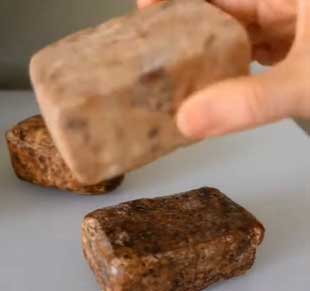Turmeric soap and African black soap are two natural skincare superstars, each offering unique benefits. While turmeric soap harnesses the anti-inflammatory and brightening power of curcumin, African black soap boasts deep cleansing and moisturizing abilities.
Turmeric soap’s vibrant hue and gentle exfoliation make it ideal for acne-prone and uneven skin, while African black soap’s coarse texture and shea butter content cater to dry, troubled complexions. Exploring the differences between these two powerhouses will help you choose the perfect match for your skincare needs.
A Brief Comparison Table
| Aspects | Turmeric Soap | African Black Soap |
| Ingredients | Turmeric, coconut oil, olive oil | Plantain peel, palm kernel oil, shea butter |
| Skin Type | Suitable for sensitive skin, acne-prone skin | Suitable for dry skin, eczema, acne |
| Benefits | Anti-inflammatory, antibacterial, antifungal | Detoxifies, moisturizes, exfoliates |
| Drawbacks | May cause skin irritation, allergic reactions | Can be harsh on sensitive skin, drying |
| Price | Generally more expensive | Generally more affordable |
Key Differences Between Turmeric Soap And African Black Soap
While both turmeric soap and African black soap offer a wealth of benefits for various skin types, they have distinct differences that set them apart. Let’s delve deeper into the key distinctions between these two natural skincare powerhouses.
- Ingredients

The star ingredient in turmeric soap is, unsurprisingly, turmeric.
This vibrant spice is packed with curcumin, a potent antioxidant with anti-inflammatory and brightening properties.
Turmeric soap is typically crafted with nourishing oils and butters like coconut, olive, or shea butter, creating a luxurious, creamy lather.
African black soap, on the other hand, is made from a unique blend of natural ingredients, primarily plantain ash, cocoa pods, and shea butter. These ingredients work together to create a deeply cleansing, exfoliating, and moisturizing soap that has been used for centuries in West African cultures.
- Color and Scent
Turmeric soap boasts a vibrant, golden-yellow to orange hue, thanks to the natural pigments found in turmeric. It also has an earthy, slightly spicy scent that some find invigorating, while others may find it overpowering.
As the name suggests, African black soap has a distinctive dark brown to black color, which comes from the plantain ash used in its creation. It has a mild, natural scent that some describe as earthy or woody, making it a great choice for those who prefer subtler aromas.
- Texture and Exfoliating Properties
Turmeric soap typically has a smooth, creamy texture that lathers beautifully, providing gentle cleansing without being overly drying or stripping. While it does offer some mild exfoliating properties, it’s not as abrasive as African black soap.
African black soap, on the other hand, has a coarse, gritty texture due to the plantain ash and cocoa pod components. This texture provides moderate to strong exfoliating benefits, helping to slough off dead skin cells and reveal a brighter, smoother complexion. However, it may be too abrasive for those with sensitive skin.
- Ideal Skin Types

Turmeric soap is an excellent choice for those with acne-prone, dull, or uneven skin.
Its anti-inflammatory, brightening, and antioxidant properties make it a great option for addressing these concerns while gently cleansing the skin.
African black soap is well-suited for dry, sensitive, and troubled skin types.
Its deep cleansing and moisturizing abilities, combined with its healing properties, make it a go-to choice for those dealing with conditions like eczema, psoriasis, or acne.
- Skin Benefits
Turmeric Soap
- Anti-inflammatory: Turmeric’s curcumin has potent anti-inflammatory properties, making it beneficial for reducing redness, swelling, and acne.
- Brightening: The antioxidants in turmeric help to fade hyperpigmentation, dark spots, and uneven skin tone, revealing a more radiant complexion.
- Antioxidant protection: Curcumin’s antioxidant properties help to neutralize free radicals, which can contribute to premature aging and skin damage.
African Black Soap
- Deep cleansing: The natural ingredients in African black soap work together to deeply cleanse the pores, removing impurities, excess oil, and environmental pollutants.
- Moisturizing: Shea butter, a key ingredient, provides intense moisture and nourishment for dry, dehydrated skin.
- Healing: African black soap is known for its ability to soothe and heal various skin conditions, such as eczema, psoriasis, and acne, thanks to its anti-inflammatory and antimicrobial properties.
Turmeric Soap: The Golden Child of Skincare
Turmeric soap has gained popularity in recent years, and for good reason. This golden-hued soap is packed with the goodness of turmeric, a spice that’s been used for centuries in traditional medicine. Turmeric contains curcumin, a powerful compound with anti-inflammatory, antibacterial, and antifungal properties.
Pros of Turmeric Soap:

- Reduces acne and inflammation: Turmeric’s antibacterial properties help combat acne-causing bacteria, reducing inflammation and preventing breakouts.
- Soothes sensitive skin: Turmeric’s anti-inflammatory properties calm irritated skin, making it an excellent option for sensitive skin types.
- Natural and gentle: Turmeric soap is often free of harsh chemicals, making it a great choice for those with skin allergies or sensitivities.
Cons of Turmeric Soap:
- May cause skin irritation: Turmeric can be too potent for some skin types, causing irritation, redness, or allergic reactions.
- Can be expensive: High-quality turmeric soap can be pricey, especially if you’re looking for a soap that’s free of harsh chemicals.
African Black Soap: The Ancient Secret to Glowing Skin
African black soap, also known as Dudu-Osun, has been used for centuries in West Africa. This soap is made from a combination of plantain peel, palm kernel oil, and shea butter, giving it a unique set of benefits.
Pros of African Black Soap:
- Detoxifies and exfoliates: African black soap helps remove dead skin cells, unclog pores, and draw out impurities, leaving your skin feeling smooth and refreshed.
- Moisturizes and nourishes: The combination of shea butter and palm kernel oil deeply moisturizes and nourishes your skin, making it an excellent option for dry skin types.
- Affordable: African black soap is generally more affordable than turmeric soap, making it a great option for those on a budget.
Cons of African Black Soap:
- Can be harsh on sensitive skin: African black soap can be too harsh for sensitive skin types, causing dryness, irritation, or even eczema flare-ups.
- May not be suitable for acne-prone skin: African black soap can be too rich for acne-prone skin, clogging pores and exacerbating breakouts.
Also Read: This Is Why Tone Bar Soaps Are So Expensive.
Frequently Asked Questions (FAQ)
Turmeric soap is made with turmeric, coconut oil, and olive oil, while African black soap is made with plantain peel, palm kernel oil, and shea butter. Turmeric soap is better suited for sensitive skin and acne-prone skin, while African black soap is better suited for dry skin and those looking for a natural exfoliant.
African black soap is an excellent option for those with dry skin, eczema, or acne. However, it may not be suitable for sensitive skin types or those with acne-prone skin. Ultimately, the best soap for you will depend on your individual skin type and needs.
Yes, you can mix turmeric with African black soap to create a custom blend that suits your skin type. However, be cautious when combining ingredients, as this can increase the risk of skin irritation or allergic reactions.
Turmeric soap can be beneficial for African American skin, as it helps reduce inflammation and acne. However, it’s essential to choose a soap that’s formulated for your skin type, as turmeric can be too potent for some skin types. Always patch test and start with a small amount to ensure you don’t experience any adverse reactions.
Wrapping Up
In conclusion, both turmeric soap and African black soap have their unique benefits and drawbacks. By understanding your skin type and needs, you can make an informed decision about which soap is right for you.
Remember, natural skincare is all about experimentation and finding what works best for your unique skin.
Happy soap-ing!
